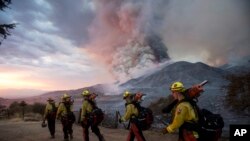Barely five weeks after the last bout of heavy rain and snow in California's historically wet winter, firefighters battled the state's first large wildfire of the year Friday in rugged foothills east of Los Angeles.
The Nob fire has scorched about 81 hectares of brush and grass in the San Bernardino National Forest since erupting on Wednesday, with 25% of the blaze's perimeter contained by Thursday night, according to the U.S. Forest Service.
The blaze posed no immediate threat to populated areas as it burned steep terrain deep in the forest, agency spokesperson Lyn Sieliet said. Its cause was under investigation.
The fire was small compared with the monster conflagrations that have become more frequent and intense in recent years, charring hundreds of thousands of hectares, devastating whole communities and forcing mass evacuations.
Still, it marked the first blaze of the 2023 season measuring 40 hectares or more, signaling the potential for extreme wildfire activity this summer and fall. Experts have warned that this winter's bountiful rainfall prompted heavy growth of grass and scrub that will dry out by summer, leaving a larger, thicker fuel bed for wildfires.
The glut of precipitation, however, also has increased the moisture content in shrubs and trees, making them more flame-resistant in the short term and helping forestall the onset of fire season.
By April 2022, three years into a crippling drought, California had tallied more than a dozen major wildfires, the Los Angeles Times reported, citing data from the California Department of Forestry and Fire Protection.
The latest fire in San Bernardino County came as low-lying communities in central California braced for possible floods from rapid runoff of melting snow in the Sierra Nevada Mountains.
Forecasters said a warming trend hastened a spring thaw following a spate of Pacific storms that pummeled California with torrential rains and mountain snow from late December until late March.





